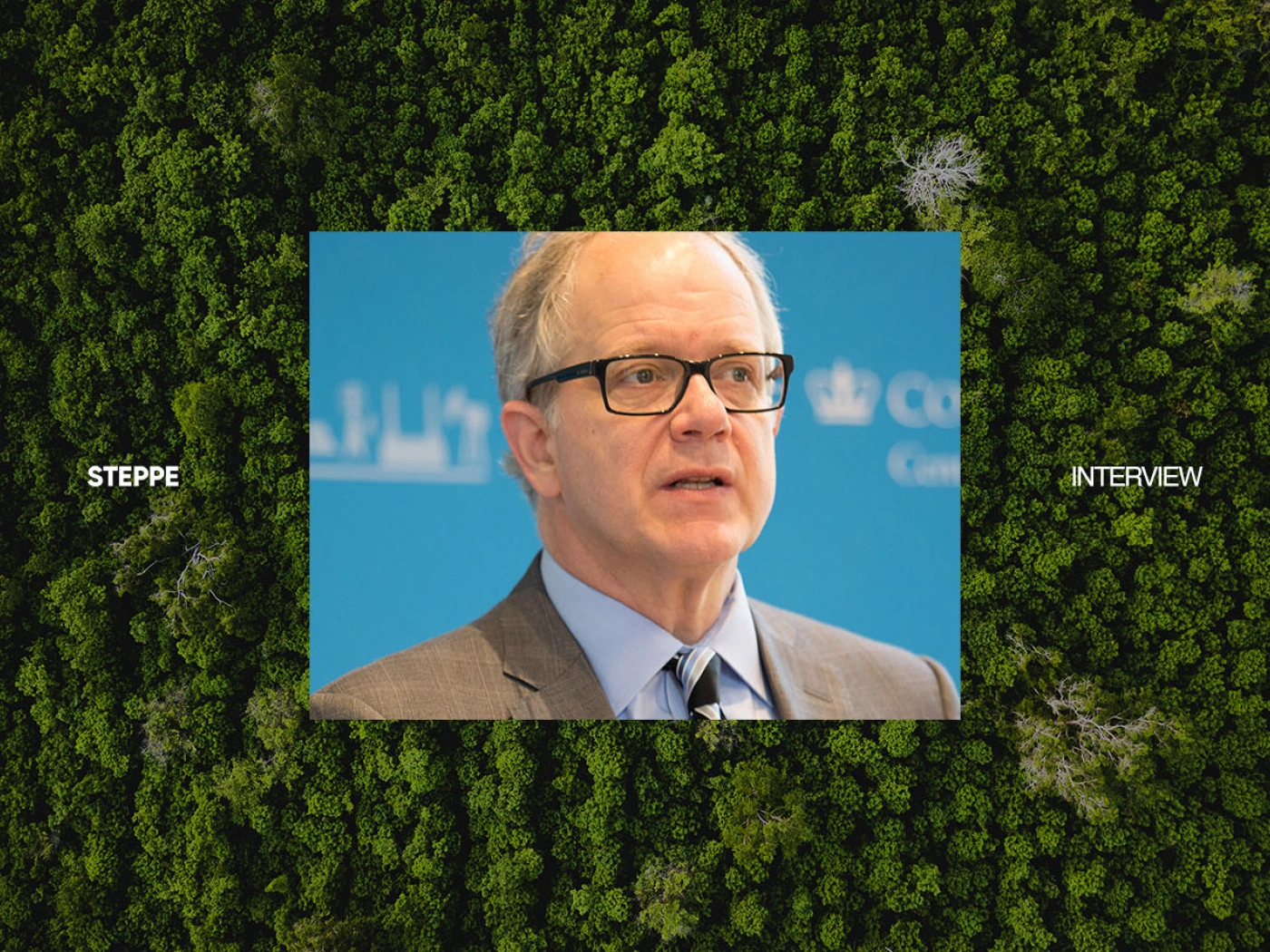
Kazakhstan Has What the World Needs: Jonathan Elkind on Central Asia’s Climate Future
Jonathan Elkind has spent his career at the crossroads of global energy and climate policy — from serving as the U.S. Assistant Secretary for International Affairs, to then researching sustainable energy systems at Columbia University.
Next week, he arrived in Ulaanbaatar for the CAMCA Regional Forum, where leaders and thinkers gather to shape the future of Central Asia. In our conversation, Elkind reflects on Kazakhstan’s climate challenges and opportunities, the critical role of regional cooperation, explaining why the idea of global energy transition cannot succeed without countries like Kazakhstan at the table.
Read STEPPE’s new interview with Jonathan on the subject of Kazakhstan’s role in a decarbonizing world.
— How would you assess the contribution of Central Asia, particularly Kazakhstan, in terms of global efforts towards combat climate change?
One of the fundamental challenges of climate change is that responding to it requires participation by all countries. Kazakhstan, and other Central Asian countries have opportunities to reduce their own emissions of greenhouse gases, and also opportunities to promote their own economic development as well. Today, Kazakhstan is an important producer of hydrocarbons, which remain essential for the current global energy economy.
Although Kazakhstan, and many of its Central Asian neighbors, also has deposits of minerals that will be essential as the global energy systems move toward zero-emissions technologies. From uranium to rare earth elements to other critical minerals, a decarbonizing global energy economy will need what Kazakhstan produces from the sub-surface.
— What could Kazakhstan learn from the international experience of economic decarbonization?
The lessons to be learned from international experience are numerous. Firstly, the transition to zero-emissions energy systems will not, and cannot, be abrupt or sudden. We will pass through a period of transition where we still use conventional energy systems even as we invest increasing amounts in non-emitting energy sources. Secondly, the transition to clean energy will require a range of different technologies, and the optimal solutions for one country or one location will not necessarily be the same as for another place. Thirdly, technology evolution will continue to be important. Innovation will help us reduce costs for clean energy, and develop novel systems that need fewer inputs. Lastly, and most importantly, simply pretending that the climate change problem does not exist is a non-starter. Basic climate science has been clear for most of the past half century. We ignore that science at our own peril.
— What current trends in international climate policy are most important for resource-rich countries like Kazakhstan?
Kazakhstan is indeed rich in resources, and its resources will play a key role in the solution to climate change. Deposits of critical minerals, those needed to deliver the transition to clean energy systems, will be vital. Although, just as Europe learned when Russia shut off natural gas supplies after Russia’s invasion of Ukraine, diversification of supply chains will also be vital (in this case, minerals supply chains). Central Asia, including Kazakhstan, can play an important role in this effort.
— How do you see Kazakhstan’s role in the transition to more sustainable energy in the Eurasian region?
Kazakhstan has a number of important ways in which it can promote more sustainable energy in the Eurasian region. It can develop non-emitting energy systems such as solar photovoltaic power, wind power, nuclear energy, geothermal energy, and energy storage. It can help to expand and diversify supplies of critical minerals. Kazakhstan has the capability to engage in trade and cooperative development with neighboring countries.
— Kazakhstan holds rich reserves of oil, gas and uranium. How does the country balance its natural resource exports with sustainable development goals?
Kazakhstan’s uranium reserves can play a vital role in supplying fuel for nuclear fission, which is one of the essential zero-emissions energy systems.
Kazakhstan’s oil and gas reserves will continue to be in demand for a number of years into the future, so they too are important for both the nation’s own economic development and the stability of global energy markets. Over time, one can expect that demand for hydrocarbons will diminish as zero-emissions energy systems are built out. But this will be a transition, not an overnight change.
— What could be the risks and opportunities in Kazakhstan’s dependence on fossil energy sources in the context of the global energy transition?
Kazakhstan’s current dependence on fossil-fuel energy sources provides national income, social development, employment, and other benefits. These are positive attributes. Although, just as decision makers in the Kingdom of Saudi Arabia are looking over the horizon to figure out what their economy may look like in future decades, so should Kazakhstan be identifying how to sustain its socio-economic development as it gradually transitions away from a fossil-fuel-dominated economy.
— What potential does Kazakhstan have in the sphere of renewable energy sources? What can contribute to their active development?
Kazakhstan has lots of renewable energy resources: wind energy, solar energy, and hydropower in mountainous regions (although changing precipitation patterns may make hydropower less reliable than in the past). A super-exciting set of new capabilities are also emerging in the United States and elsewhere for advanced geothermal development, and this is another area that could hold great promise for Central Asia — consistent, dispatchable power with zero emissions. And this all is without remarking on nuclear power (which is not «renewable» per se but is zero-emissions).
Geopolitical context and regional cooperation
— How important is regional cooperation in the climate agenda for Central Asian countries, and what role can Kazakhstan play there?
Regional cooperation among the Central Asian countries can help all parties reduce costs, in order to attract more attention from external investors, and promote regional growth. In the past, such regional cooperation was challenging due to friction between leaders, but these days there is greater opportunity in this area.
— How does the interest of major powers (US, China, EU) in the Central Asian region change in the context of energy and environment?
All major powers see the potential in the Central Asian region to contribute to modern energy systems, and to other forms of economic development. Kazakhstan and the other countries of Central Asia may wish to think about how to avoid having a monopoly relationship with any single major power, but instead open doors to all, thus enabling greater benefits for the people of Central Asia.
— What are the prospects for Kazakhstan’s climate diplomacy: could the country become a “bridge” between the East and West regarding energy issues?
Unfortunate to say, but at present, the chief obstacle to progress on climate solutions comes from my own country — the United States. So while Kazakhstan and other countries could play constructive roles in «climate diplomacy», it is not the critical shortcoming at present.
This is not to say that finding solutions on climate change is magically quick and easy. The global community needs to find approaches that deliver quick and sizable reductions in greenhouse gas emissions without mistakenly believing that all solutions can be instituted at once, overnight. These approaches need to provide for energy systems that are secure, resilient, and affordable — not simply low in emissions.
Although at present, official Washington pretends as if the climate issue is not a priority. And this could not be any farther from the truth.
Read More: «People Don’t Fall in Love in a Traffic Jam»: An Interview with Architect Riccardo Marini





